
REVIEWS IN MEDICAL VIROLOGY
Scope & Guideline
Transforming Understanding of Viral Challenges
Introduction
Aims and Scopes
- Viral Pathogenesis and Mechanisms:
The journal extensively explores the molecular and cellular mechanisms by which viruses cause disease, including the interaction between viral components and host cellular machinery. - Clinical Implications and Therapeutic Strategies:
A significant focus is placed on the clinical outcomes of viral infections, including diagnostic methods, treatment options, and the evaluation of vaccine efficacy and safety. - Epidemiology and Public Health:
Research published in the journal frequently addresses the epidemiological trends of various viral infections, their impact on public health, and strategies for prevention and control. - Neurovirology and Neurological Manifestations:
The journal highlights the neurological effects of viral infections, discussing both direct effects of viruses on the nervous system as well as indirect effects through immune-mediated mechanisms. - Emerging and Re-emerging Viruses:
There is a growing emphasis on emerging and re-emerging viral diseases, particularly those with significant public health implications, such as COVID-19 and other zoonoses.
Trending and Emerging
- COVID-19 Research:
The journal has seen a significant increase in publications related to COVID-19, covering various aspects such as vaccine efficacy, clinical outcomes, and long-term effects of infection. - Viral Co-Infections:
There is an emerging trend focusing on the implications of viral co-infections, particularly how co-infections can influence disease severity and treatment outcomes in patients. - Immunological Responses and Biomarkers:
Research on the immune response to viral infections, including the identification of biomarkers for disease progression and therapeutic targets, is becoming increasingly prominent. - Neurovirology and Neurological Impact:
Publications addressing the neurological consequences of viral infections are on the rise, highlighting the need for understanding viral impacts on the central nervous system. - Advanced Therapeutic Approaches:
The journal is increasingly publishing studies on novel therapeutic strategies, including the use of monoclonal antibodies, antiviral agents, and gene therapy for managing viral infections.
Declining or Waning
- Traditional Virology Techniques:
There has been a noticeable decline in papers focusing on traditional virology methods, such as basic cell culture techniques, as the field shifts toward more advanced molecular and genomic approaches. - Single Virus Studies:
Research concentrating on single viral pathogens without considering co-infections or broader viral syndromes is becoming less common, reflecting a shift towards understanding the complexity of viral interactions in co-infection scenarios. - Non-Clinical Aspects of Viral Infections:
Themes related to purely theoretical or non-clinical aspects of viral infections, such as basic viral genetics without direct clinical application, are becoming less emphasized in the journal. - Historical Perspectives on Viruses:
There seems to be a waning interest in purely historical analyses of viral outbreaks, with more emphasis now placed on current and future implications of viral research.
Similar Journals
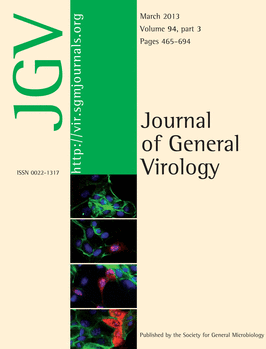
JOURNAL OF GENERAL VIROLOGY
Pioneering insights into viral mechanisms and therapies.The JOURNAL OF GENERAL VIROLOGY, published by the Microbiology Society, is a premier academic journal dedicated to advancing the field of virology. Established in 1967, this influential journal covers a wide spectrum of research from basic virology to applied studies, serving as a vital resource for researchers, professionals, and students alike. With its ISSN 0022-1317 and E-ISSN 1465-2099, the journal is recognized for its rigorous peer-review process and high-quality publications, attaining a commendable Q2 ranking in the Virology category for 2023. The journal's focus on disseminating innovative findings and fostering critical discussions contributes significantly to the understanding of viral mechanisms, disease processes, and potential therapeutic strategies. Although it does not currently offer Open Access options, the journal remains accessible to the academic community, with a strong commitment to supporting virology research globally. As part of Scopus' top-tier rankings, illustrating its impact within the category of Immunology and Microbiology, the JOURNAL OF GENERAL VIROLOGY continues to play a pivotal role in shaping the future of virological science.
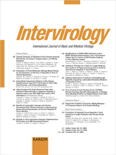
INTERVIROLOGY
Pioneering insights for a viral-free future.INTERVIROLOGY is a leading academic journal dedicated to advancing the field of virology and infectious diseases, published by KARGER. With a commendable history since its inception in 1973, the journal is currently poised to explore innovative virological research through to 2024. INTERVIROLOGY is indexed with the ISSN 0300-5526 and E-ISSN 1423-0100, reflecting its commitment to maintaining high scholarly standards. The journal is categorized within the Q3 quartile for both Infectious Diseases and Virology as of 2023, demonstrating its relevance and contribution to the academic community. With Scopus rankings placing it as #130 in Infectious Diseases and #41 in Virology, INTERVIROLOGY serves as an essential resource for researchers, professionals, and students seeking cutting-edge insights and discoveries in virology. While it currently operates under a subscription model, its rigorous peer-review process ensures a high quality of published content, making it a cornerstone for those dedicated to understanding and combating viral diseases.
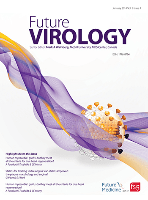
Future Virology
Innovating Solutions for Global Health ChallengesFuture Virology, published by Future Medicine Ltd, is an essential journal dedicated to advancing the understanding of virology in the contemporary scientific landscape. With an ISSN of 1746-0794 and an E-ISSN of 1746-0808, this journal serves as a platform for researchers and practitioners in the field to publish high-quality, peer-reviewed articles that explore novel discoveries, innovative therapeutic strategies, and the implications of viral research on global health. Operating from the United Kingdom and maintaining a commitment to rigorous scientific inquiry, Future Virology is categorized in the Q4 Quartile for Virology according to the latest Scopus rankings, with a position of Rank #48/80 and a percentile of 40th in the Virology category. Although it currently does not offer open access, the journal strives to disseminate critical insights that benefit a wide range of professionals, researchers, and students engaged in virology and related fields. By bridging the gap between basic research and practical applications, Future Virology plays a crucial role in fostering innovation and collaboration in the ever-evolving virology landscape.

Annual Review of Virology
Unveiling the latest breakthroughs in virology.Annual Review of Virology is a premier scholarly journal published by Annual Reviews, dedicated to advancing the field of virology through comprehensive and insightful reviews. Since its inception in 2014, this journal has established itself as a leading resource for researchers, professionals, and students alike, achieving an impressive Q1 ranking in the field of Virology and a Scopus rank of #10 out of 80 in its category, placing it in the 88th percentile. The journal features in-depth analyses of the latest developments in virology, encompassing various aspects such as viral pathogenesis, host interactions, and antiviral strategies, thereby catering to a diverse audience seeking the most relevant and cutting-edge information. Although it is not Open Access, Annual Review of Virology remains an indispensable tool for those engaged in virology research, transforming complex findings into accessible knowledge that shapes future investigations and practical applications in the field.

Journal of Virus Eradication
Uniting scholars to tackle viral challenges.Welcome to the Journal of Virus Eradication, a premier publication dedicated to advancing the field of virology and infectious disease research. Published by MEDISCRIPT LTD, this journal provides a vital platform for sharing cutting-edge research findings in key areas including epidemiology, immunology, and public health. With an impressive classification of Q2 in Epidemiology and Infectious Diseases for 2023, this journal exemplifies a commitment to high-quality scholarship and impactful research. The Journal of Virus Eradication is instrumental in disseminating knowledge that tackles viral threats, contributing to global health initiatives aimed at virus containment and eradication. Researchers, professionals, and students alike will find this journal an invaluable resource, making significant contributions to the scientific community and society at large.

Hepatitis Monthly
Connecting researchers to reshape hepatitis care.Hepatitis Monthly, published by BRIEFLAND in the Netherlands, is a pivotal journal in the fields of hepatology and infectious diseases. Established in 2007, it continues to make significant contributions to the understanding and management of hepatitis and related viral infections with a publication timeline extending through to 2024. Aiming to disseminate high-quality research, the journal serves as a forum for groundbreaking studies and innovations essential for healthcare professionals, researchers, and students alike. While it currently holds Q4 rankings in both hepatology and infectious disease categories, its ongoing commitment to addressing pressing health issues makes it an important resource in the academic community. Although it operates under a traditional access model, Hepatitis Monthly not only publishes original research articles, reviews, and case studies but also encourages the exchange of knowledge that helps shape future research directions and clinical practices. As it continues to explore the complexities surrounding viral hepatitis, this journal invites researchers to contribute to its mission of advancing scientific understanding and improving patient care.

VIROLOGICA SINICA
Pioneering Insights into Molecular Medicine and ImmunologyVIROLOGICA SINICA, published by KEAI PUBLISHING LTD, is a leading international journal dedicated to the field of virology. With an ISSN of 1674-0769 and E-ISSN of 1995-820X, this esteemed journal showcases cutting-edge research from 2006 to 2024, focusing on critical developments in Immunology, Infectious Diseases, Molecular Medicine, and Virology. As evidenced by its respectable positioning in the Q2 quartile of relevant categories and impressive Scopus rankings—such as Rank #20/80 in Virology—VIROLOGICA SINICA serves as an essential resource for researchers, professionals, and students aiming to deepen their understanding of viral pathogens and their impact on human health. While the journal does not currently offer open access, it remains an invaluable publication for those seeking to stay at the forefront of virology research. Its address is located at 16 Donghuangchenggen North St, Beijing, China, where it continues to foster academic excellence in the rapidly evolving landscape of virology.
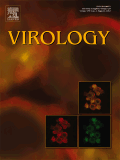
VIROLOGY
Illuminating the Impact of Viruses on HealthVirology, published by Academic Press Inc. Elsevier Science, is a prominent journal dedicated to advancing the knowledge and understanding of viral biology and pathogenesis since its inception in 1955. With a distinguished impact factor and recognized as a Q2 journal in the field of Virology for 2023, it ranks 38 out of 80 in the Scopus database for Immunology and Microbiology, placing it in the 53rd percentile among similar publications. This esteemed journal provides a platform for groundbreaking research, critical reviews, and comprehensive studies that contribute to our global understanding of viruses and their impact on health and disease. Although currently not an open-access journal, it remains accessible to a wide audience of researchers, professionals, and students who are keen to explore the latest advancements in virological research. The journal's scope encompasses a diverse range of topics, ensuring that it serves as an essential resource for anyone engaged in virology and related biomedical fields.
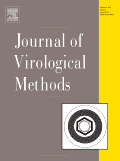
JOURNAL OF VIROLOGICAL METHODS
Exploring new frontiers in viral research methodologies.Journal of Virological Methods, published by Elsevier, is a prominent peer-reviewed journal dedicated to advancing the methodologies employed in virology research. Since its inception in 1980, this esteemed journal has become a vital resource for researchers, professionals, and students focused on the intricate study of viruses and viral-related diseases. With a current ISSN of 0166-0934 and an E-ISSN of 1879-0984, this journal strives to present innovative techniques and tools that enhance our understanding of virology. Designed for a global audience, it operates in a rigorous academic environment, as reflected by its 2023 Scopus ranking of #40 in the Virology category and its Q3 quartile placement. The journal is committed to fostering open dialogue and collaboration within the scientific community, ultimately contributing to the development of novel strategies and interventions against viral infections. By offering comprehensive insights into virological methodologies, the Journal of Virological Methods continuously serves as a cornerstone for those dedicated to exploring the complexities of viral research.

Frontiers in Virology
Connecting Researchers for Global Viral SolutionsFrontiers in Virology, published by FRONTIERS MEDIA SA, is an innovative open-access journal dedicated to advancing the understanding of viral biology, pathogenesis, surveillance, and control strategies. With the rapid evolution of viral threats, this journal serves as a critical platform for researchers, professionals, and students to disseminate and access high-quality research, reviews, and perspectives in virology. The journal places a strong emphasis on interdisciplinary approaches, promoting collaborative efforts that drive breakthroughs in the field. While the specific impact factor and H-index details are currently unavailable, Frontiers in Virology is committed to rigorous peer review and integrity in scientific publishing. Authors and readers will benefit from the extensive reach provided by open access, making groundbreaking insights available to a global audience, thus contributing significantly to the ongoing dialogue in virology and public health.